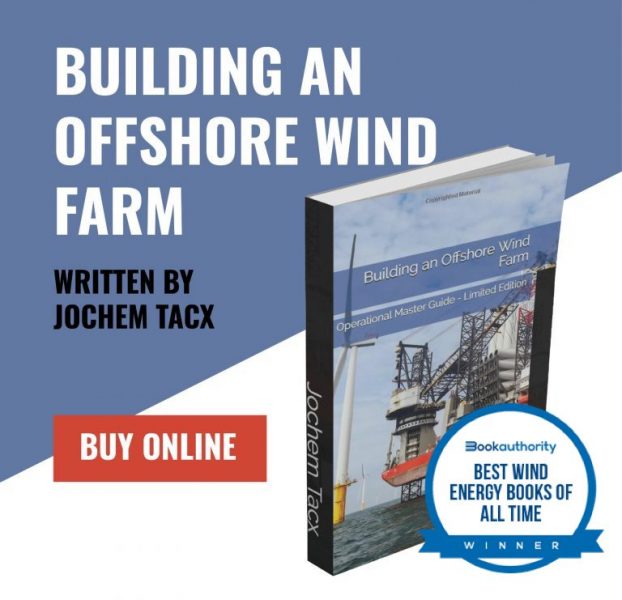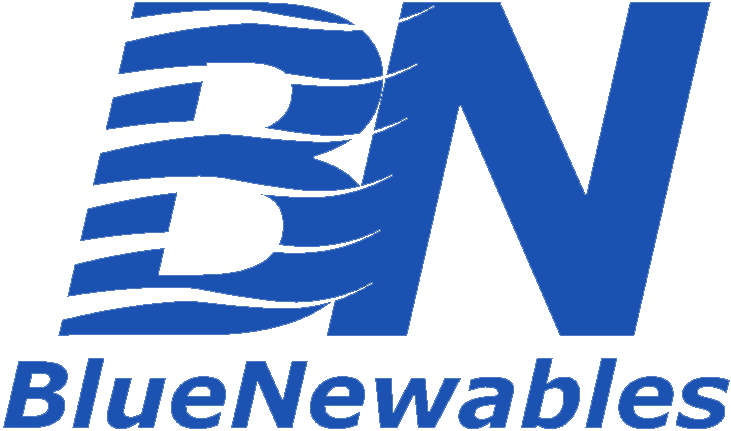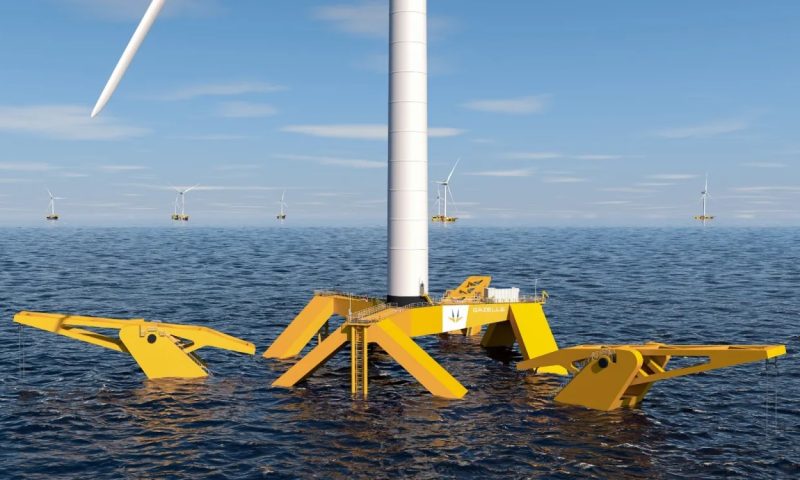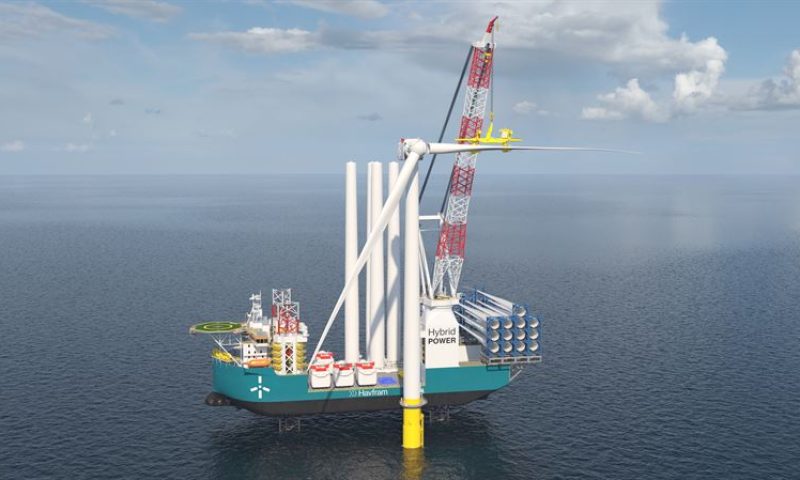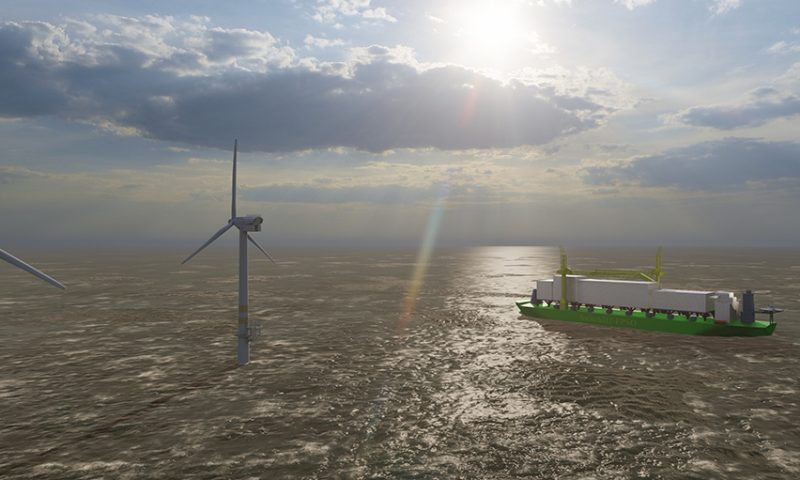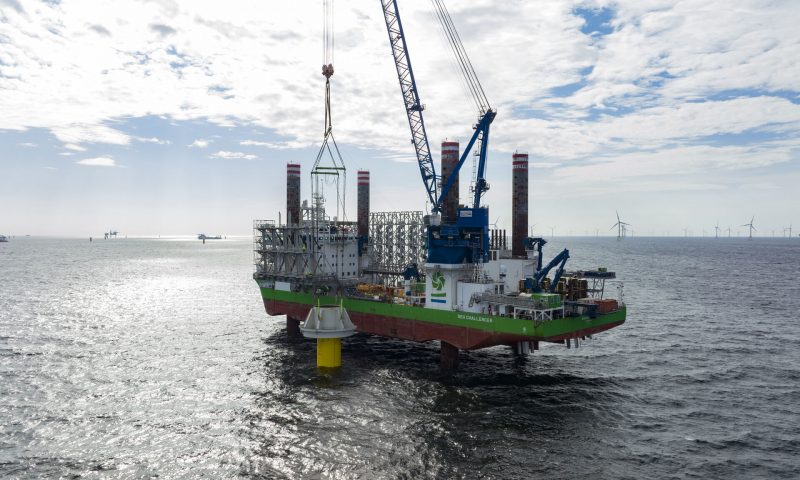
World’s first: Innovative steel collars installed at RWE’s Kaskasi wind farm in the German North Sea
An innovative foundation technology is celebrating its premiere at RWE’s Kaskasi offshore wind farm: For the first time ever in the renewables industry special collars were installed around the monopile foundation at seabed level. The ‘collared monopile’ is a design based on a RWE patent. The new technology will provide additional support for lateral loading, increase the bearing capacity and improve the structural integrity of the entire foundation. Installation works were carried out by DEME Offshore.
Sven Utermöhlen, CEO Offshore Wind, RWE Renewables: “At our Kaskasi offshore wind farm we use innovative technologies that will set standards throughout the entire offshore industry. It’s a great credit to the project team and our contractors that we developed, manufactured and safely installed the three innovative foundation collars. The collared monopile, a patented solution developed in-house, will help to increase stability in difficult ground. This showcases our technical expertise as the second largest player in offshore wind globally.”
Collared monopiles strengthen behaviour of entire structure
Kaskasi is RWE’s sixth wind farm off the German coast, the 342-megawatt project is currently under construction 35 kilometres north of the island of Heligoland. In total three innovative foundation collars were successfully embedded into the seabed – each 7metres high, weighing 170 tons. The installation in water depths of up to 25 metres was carried out by the jack-up vessel ‘Sea Challenger’ from DEME Offshore. The space between collar and monopile foundation was filled with grout material, creating finally a stable connection. RWE will carry out accompanying tests to verify that the collar improves the structural behaviour in comparison with standard monopiles.
The detailed design of the collars was developed by the German civil engineering company JBO based on the RWE patent, Bladt Industries was selected as manufacturer and DEME Offshore was responsible for the transportation and installation.
Bas Nekeman, Business Unit Director Northern Europe at DEME Offshore, emphasises: “Whilst these monopile foundation collars represent only a relatively small scope of work DEME Offshore is performing at the Kaskasi offshore wind farm, we are extremely happy achieving this important milestone for the project. The installation of these type of structures is a world’s first which required us to develop a tailor-made solution. The completion of the three monopile foundation collars demonstrates our ability to deliver our customers the right technical know-how, operational excellence and team spirit required for the successful delivery of these types of innovative projects.”
RWE tests world’s first recyclable wind turbine blade
The collared monopile is only one example of how RWE is leading technological development in the offshore wind industry. Further innovations introduced at Kaskasi are the vibro pile driving technology and the ‘Self-Expanding Pile Shoe’, a new foundation solution with a concrete ring that expands in the seabed. In addition, a sustainable product will be celebrating its German premiere: At Kaskasi offshore wind farm Siemens Gamesa and RWE will equip a number of wind turbines with recyclable rotor blades. The blades are the first of their kind, thanks to an innovative resin that enables components to be recycled for new applications at the end of their lifecycle. Installation of the wind turbines is scheduled to start this summer. By the end of 2022 a total of 38 wind turbines are to be fully operational. Then, the Kaskasi offshore wind farm will have the capacity to supply the equivalent of approximately 400,000 households with green electricity every year.
Tailwind for RWE and the energy transition in Germany
RWE is one of the leading companies in the field of renewable energies and No. 2 worldwide in offshore wind. As part of its ambitious investment and growth strategy, “Growing Green”, the company plans to triple its global offshore wind capacity by 2030, thus increasing from the current 3 gigawatts (GW) to 8 GW. Also in Germany, RWE is stepping up the pace: by 2030, the company intends to invest up to 15 billion euros in the green energy sector. RWE continues to expand in the offshore wind energy market too: together with its Canadian partner, Northland Power, RWE is driving forward the development of a large offshore wind cluster in the German North Sea. The partners plan to construct a cluster of three wind farms north of the German island of Juist with a total installed capacity of over 1.3 GW, which are expected to commence operation in 2026 and 2028 respectively. These planned offshore wind farms will be able to produce enough green electricity to meet the requirements of up to 1.6 million households per year. RWE is also developing a further wind farm in the direct vicinity with a capacity of 225 megawatts.



